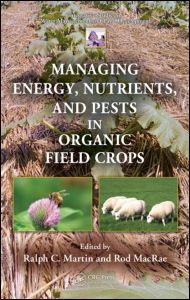Description
Managing Energy, Nutrients, and Pests in Organic Field Crops
Integrative Studies in Water Management & Land Development Series
Coordinators: Martin Ralph C., MacRae Rod
Language: English
Subjects for Managing Energy, Nutrients, and Pests in Organic Field Crops:
Keywords
Sweet Corn; Hairy Vetch; farming; Composted Beef Cattle Manure; arbuscular; Organic Field Crop; mycorrhizal; Soil Fertility; fungi; Field Crop; weed; Lammerts Van Bueren; control; GxE Interaction; agriculture; Pest Management; systems; Insect Pest; conventional; Soil Quality; cropping; Cultivar Mixtures; Energy Efficiency; Organic Cropping Systems; Perennial Plant Cover; Weedy Conditions; Codling Moth; Rotary Hoe; Mechanical Weed Control; Insect Pest Management; PR Dissolution; Green Manure Cover Crop; Insect Pests; Reduced Tillage; Efficient Remobilization
Publication date: 02-2014
Support: Print on demand
Publication date: 09-2019
· 15.6x23.4 cm · Paperback
Description
/li>Contents
/li>Readership
/li>Biography
/li>
The use of organic management practices in field cropping continues to rise globally, and these methods have proven to be a viable way to produce food with reduced resource use and environmental damage. Managing Energy, Nutrients, and Pests in Organic Field Crops challenges the popular misconception that organic systems are weak at managing energy, nutrients, and pests and shows how innovative farm designs can enhance organic performance. It provides information for assessing the current state of knowledge on organic field cropping and for making the systems more viable.
Each chapter summarizes the latest data from a wide range of sources, creating a comprehensive and coherent picture of the issues and integrating agronomic, economic, and policy aspects. Many chapters also include recent research from the authors. Section I, Soil Health, examines the importance of phosphorus balance, soil fertility, and tillage reduction. Section II, Pest Management, focuses on integrated weed management and long-term approaches to insect management.
Section III, Integrating Approaches, addresses multiple field cropping challenges. Chapters cover the oldest organic rotational trials in Canada, the issue of using cereals bred for conventional systems and more targeted organic cereal breeding strategies, and case studies of a broad spectrum of farming experiences that explore the broader social and ecological landscape. The final section, Economics, Energy, and Policy, examines environmental issues not previously addressed in the text as well as consumer, economic, and rural community matters. It also presents a reprint of an article that describes policies and programs (and their costs) needed to advance adoption of organic farming in Ontario. The text wraps up with key conclusions and a discussion of overarching themes for the book, summarizing the strengths of the available tool box for organic producers and the challenges that remain.
Section I: Soil Health. Section II: Pest Management. Section III: Integrating Approaches. Section IV: Economics, Energy, and Policy. Index.
Rod MacRae, Ph.D., is an associate professor in the Faculty of Environmental Studies, York University, Toronto, Ontario, Canada. His research focuses on creating a national food and agriculture policy for Canada and the set of coherent and comprehensive programs required to support such a policy. He has published extensively on this topic in the academic and popular press and has also conducted numerous policy analyses for the Canadian organic food sector.
Ralph C. Martin, Ph.D., grew up on a beef and hog farm in Wallenstein, Ontario, Canada. His love of teaching grew unexpectedly when he began teaching at the Nova Scotia Agricultural College, in 1990, and realized how students teach him too. In 2001, he founded the Organic Agriculture Centre of Canada to coordinate university research and education pertaining to organic systems across Canada. In 2011, he was appointed professor and Loblaw Chair in Sustainable Food Production at the University of Guelph.




